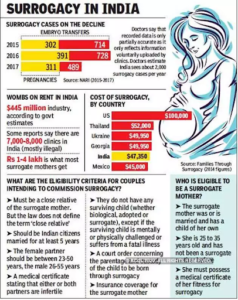In news– The announcement by Tamil film director Vignesh and his wife, actor Nayanthara, that they had become parents to twin boys is building up into a controversy, with speculations that the couple opted for surrogacy.
What is surrogacy?
As per The Surrogacy (Regulation) Act, 2021 (SRA), Surrogacy is defined by law as “a practice whereby one woman bears and gives birth to a child for an intending couple” and intends to hand over the child to them after the birth.
What are the conditions for allowing surrogacy in India?
- The Surrogacy (Regulation) Act, 2021 (SRA) allows for surrogacy to be available only to infertile Indian married couples.
- The other legislation on this matter, the Assisted Reproductive Technology (ART) (Regulation) Act, 2021, defines ART procedures as all techniques that attempt to obtain a pregnancy by handling the sperm or the oocyte (the immature female egg) outside the human body and transferring into the reproductive system of a woman.
- This is open to married couples, live-in partners, single women, and also foreigners. ART procedures include gamete donation, intrauterine insemination, and in-vitro fertilisation or IVF.
- The SRA Act says the surrogate should be married and have a child of her own.
- Restricting altruistic surrogacy to legally wedded infertile Indian couples, the Act sets an age limitation for the couple where a husband must be between 26 and 55 years of age and a wife between 23 and 50 years.
- Further, Indian couples with biological or adopted children are prohibited to undertake surrogacy, save for some exceptions such as mentally or physically challenged children, or those suffering from a life-threatening disorder or fatal illness.
- Even within this category of people, commercial surrogacy is banned in India and that includes the “commercialisation of surrogacy services or procedures or its component services or component procedures”.
- The surrogate woman cannot be given payments, rewards, benefits or fees, “except the medical expenses and such other prescribed expenses incurred on the surrogate mother and the insurance coverage for the surrogate mother”.
- Relevant authorities have been set up by the Act at several levels to check whether these specifications have been met. All surrogacy clinics must be registered with the government and only then can they conduct the procedure.
- The central and the state governments are to constitute the National Surrogacy Board (NSB) and the State Surrogacy Boards (SSB), respectively.
- Functions of the NSB include advising the central government, laying down the code of conduct of surrogacy clinics and reviewing the implementation of the Act.
- Similarly, appropriate authorities are constituted at national and state levels to grant or suspend clinics’ licences, to check on complaints of breach of the Act’s provisions and carry out other similar tasks.
- For example, certificates of proven infertility/expert medical reports of either spouse or of an intending couple from a District Medical Board are mandatory.
- A certificate of eligibility issued by the appropriate authority shows the criteria have been met – both by the to-be parents and the surrogate woman.
- Other requisite authorities, such as the Director or in-charge of the surrogacy clinic must also be satisfied that conditions have been met.
- Commercial surrogacy, among other offences, can lead to imprisonment for a term of at least 10 years and a fine extending to Rs 10 lakh.

Further reading: https://journalsofindia.com/surrogacy-regulation-bill/
















